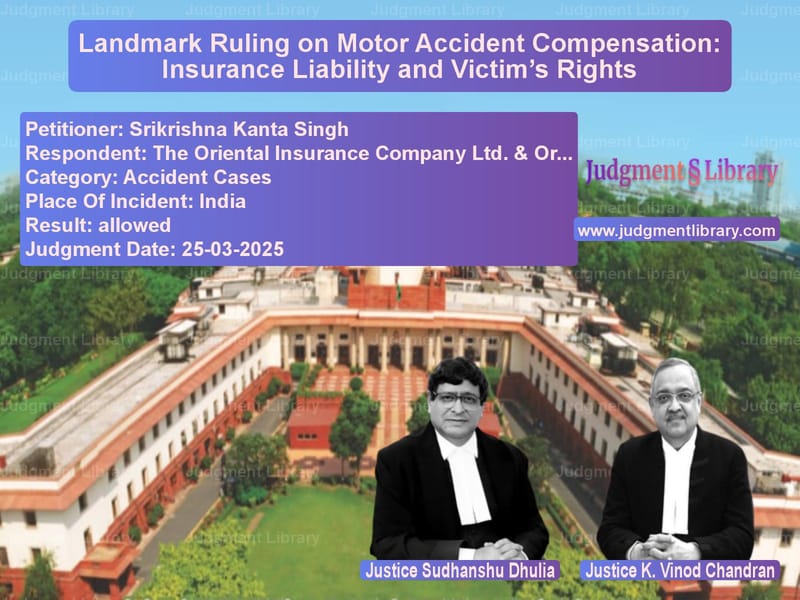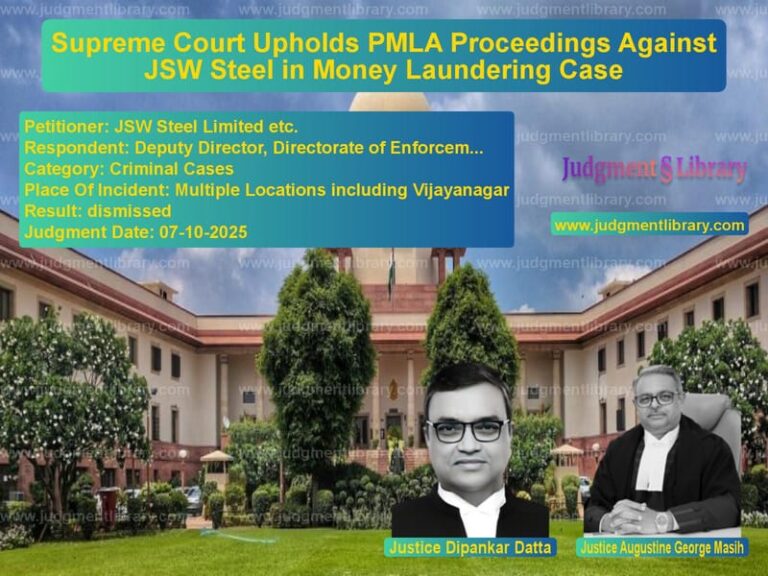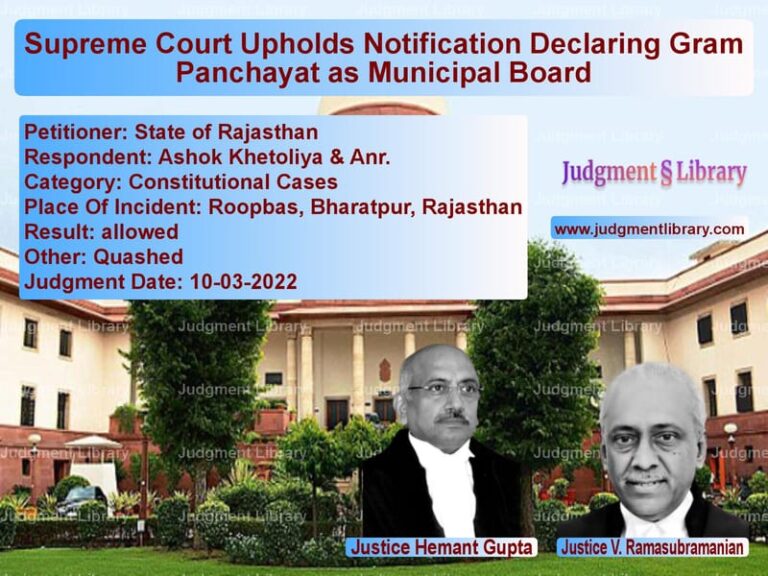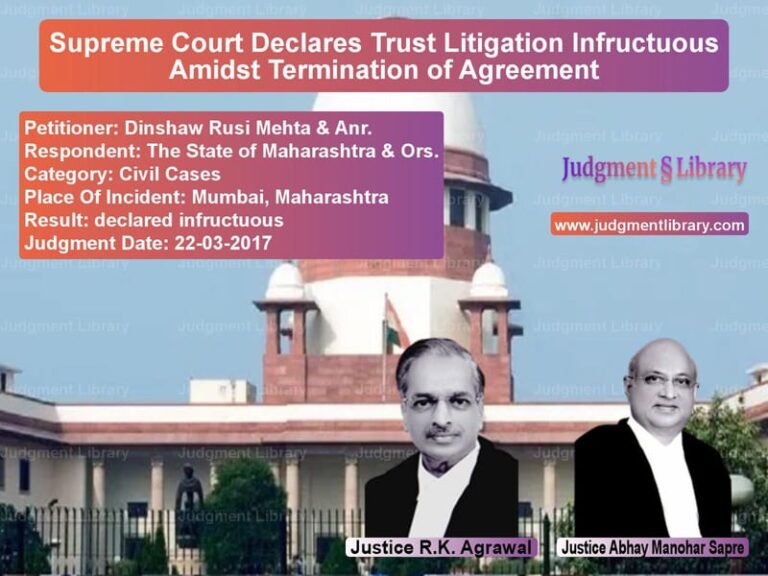Landmark Ruling on Motor Accident Compensation: Insurance Liability and Victim’s Rights
A tragic accident changed the life of Srikrishna Kanta Singh, a young Block Development Officer (BDO), forever. What started as a routine pillion ride turned into a devastating event that led to the amputation of both his legs. Seeking justice and rightful compensation, he approached the courts, and after years of legal battle, the Supreme Court of India delivered its final verdict on March 25, 2025.
The Accident and Its Aftermath
The accident occurred on November 3, 1999, when Srikrishna Kanta Singh was riding as a pillion passenger on a scooter. A long trailer vehicle, moving in the opposite direction, collided with the scooter. The injuries sustained were catastrophic, resulting in the loss of both legs. Following the incident, Singh filed a claim under Section 166 of the Motor Vehicles Act, 1988, seeking a compensation of ₹16,00,000 to cover his medical expenses, cost of prosthetics, and loss of income.
Initial Tribunal Ruling
The Motor Accident Claims Tribunal (MACT) ruled that Singh was entitled to ₹7,50,000 in compensation, with 60% of the liability falling on the insurance company and 40% on the owner of the scooter. However, Singh challenged this decision, arguing that the awarded amount was inadequate and that the negligence on the part of the trailer driver was overlooked.
High Court Appeal and Judgment
The High Court upheld the Tribunal’s decision and even suggested that Singh bore some responsibility for the accident. It reasoned that:
- The scooter driver held only a learner’s license and was not authorized to carry a pillion rider.
- The accident occurred at the tail end of the trailer, suggesting that the scooter driver should have been more careful.
- Singh allegedly used his authority as a BDO to pressure the scooter driver into giving him a ride.
Disappointed with this ruling, Singh took his case to the Supreme Court, seeking a fair assessment of the liability and appropriate compensation.
Supreme Court Arguments and Observations
Petitioner’s Arguments:
- Singh’s counsel argued that the High Court wrongly attributed contributory negligence to the scooter driver, as there was no substantial evidence to prove this claim.
- The accident report and charge sheet clearly indicated that the trailer driver was driving rashly and negligently.
- The compensation awarded was inadequate given the severity of injuries, medical expenses, cost of prosthetic limbs, and the lifelong impact of disability.
The petitioner’s counsel stated: “The findings of the High Court are erroneous and not based on solid evidence. The liability of the trailer driver is clearly established, and Singh is entitled to full compensation.”
Respondent’s Arguments (Insurance Company & Other Parties):
- The insurance company maintained that both the trailer driver and the scooter driver were at fault, thereby justifying the shared liability.
- The defense contended that Singh was aware of the scooter driver’s learner’s license yet still chose to travel with him.
- They also objected to the inclusion of additional medical expenses in the claim, arguing that those bills were not part of the original petition.
The insurance company’s counsel argued: “The Tribunal has already apportioned liability correctly. The claimant cannot shift the entire burden to the insurer while ignoring the negligence on the part of the scooter driver.”
Supreme Court’s Ruling and Key Observations
The Supreme Court delivered a well-reasoned judgment, making the following critical observations:
- The accident investigation report and charge sheet explicitly found the trailer driver to be negligent. This was sufficient to hold the insurance company liable.
- The High Court’s conclusion that Singh used his position to coerce the scooter driver into carrying him was speculative and not supported by evidence.
- A learner’s license alone does not establish negligence. The key issue is whether the scooter driver’s actions contributed to the accident, which was not proven in this case.
Key Verbal Arguments by the Supreme Court:
The Court firmly stated: “Finding that the driver was not cautious is one thing, but finding negligence is quite another. The standard of proof required is the preponderance of probability, and in this case, the insurer has failed to establish contributory negligence.”
Regarding the insurance company’s contention, the Court observed: “When a motor accident occurs, the burden of proof lies on the party alleging contributory negligence. Here, the insurer has failed to prove any such negligence on the part of the scooter driver.”
The Supreme Court found that the Tribunal and High Court erred in their assessment of liability and compensation.
Revised Compensation Awarded
The Court revisited the compensation claims and made the following adjustments:
| Claim Head | Amount Claimed | Final Award |
|---|---|---|
| Medical Treatment & Transport | ₹2,00,000 | ₹1,10,000 |
| Artificial Limbs (Prosthetics) | ₹3,00,000 | ₹1,20,000 |
| Permanent Disability | ₹4,00,000 | ₹5,00,000 |
| Pain & Suffering | ₹2,00,000 | ₹2,00,000 |
| Loss of Amenities of Life | ₹3,00,000 | ₹5,00,000 |
| Cost of Personal Attendant | ₹2,00,000 | ₹2,00,000 |
The Supreme Court ultimately awarded Singh the full ₹16,00,000 compensation he originally sought, with an additional directive that the insurance company pay simple interest of 7% per annum from the date of the award.
Final Judgment and Conclusion
The Court allowed the appeal and directed the insurer to pay the enhanced compensation within two months.
The ruling reaffirmed key legal principles:
- Contributory negligence must be proven with substantial evidence.
- Accident compensation should be fair and sufficient to cover medical costs and loss of quality of life.
- Victims of accidents should not be unfairly burdened due to weak or unsubstantiated claims of negligence.
This landmark judgment ensures that accident victims receive just compensation and sets a precedent for future cases involving insurance disputes.
Petitioner Name: Srikrishna Kanta Singh.Respondent Name: The Oriental Insurance Company Ltd. & Ors..Judgment By: Justice Sudhanshu Dhulia, Justice K. Vinod Chandran.Place Of Incident: India.Judgment Date: 25-03-2025.
Don’t miss out on the full details! Download the complete judgment in PDF format below and gain valuable insights instantly!
Download Judgment: srikrishna-kanta-sin-vs-the-oriental-insuran-supreme-court-of-india-judgment-dated-25-03-2025.pdf
Directly Download Judgment: Directly download this Judgment
See all petitions in Road Accident Cases
See all petitions in Compensation Disputes
See all petitions in Negligence Claims
See all petitions in Motor Vehicle Act
See all petitions in Judgment by Sudhanshu Dhulia
See all petitions in Judgment by K. Vinod Chandran
See all petitions in allowed
See all petitions in supreme court of India judgments March 2025
See all petitions in 2025 judgments
See all posts in Accident Cases Category
See all allowed petitions in Accident Cases Category
See all Dismissed petitions in Accident Cases Category
See all partially allowed petitions in Accident Cases Category







